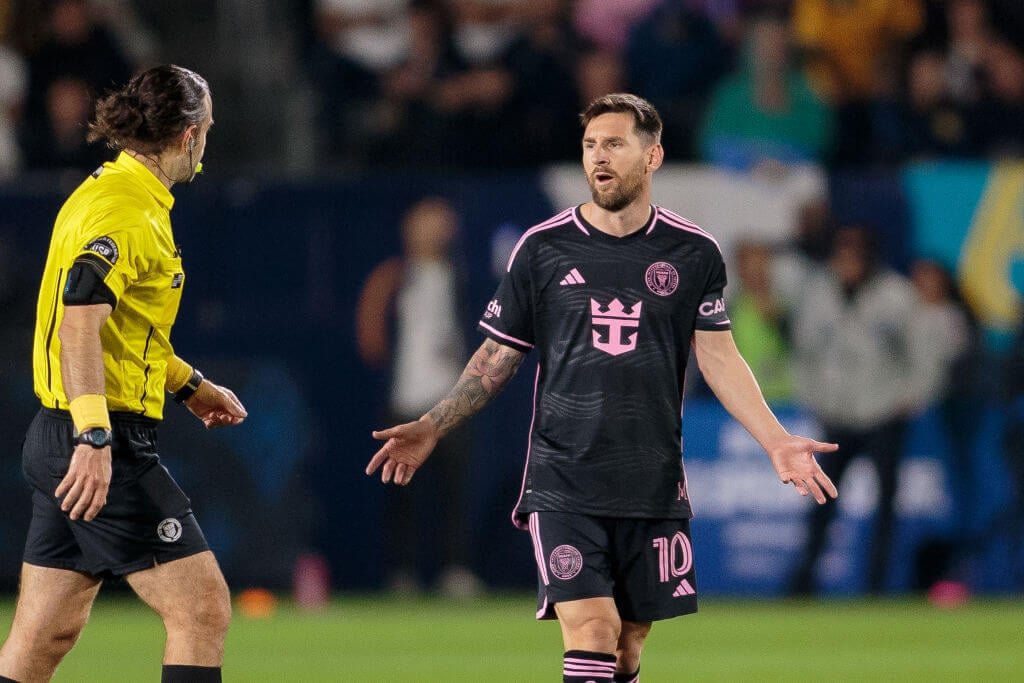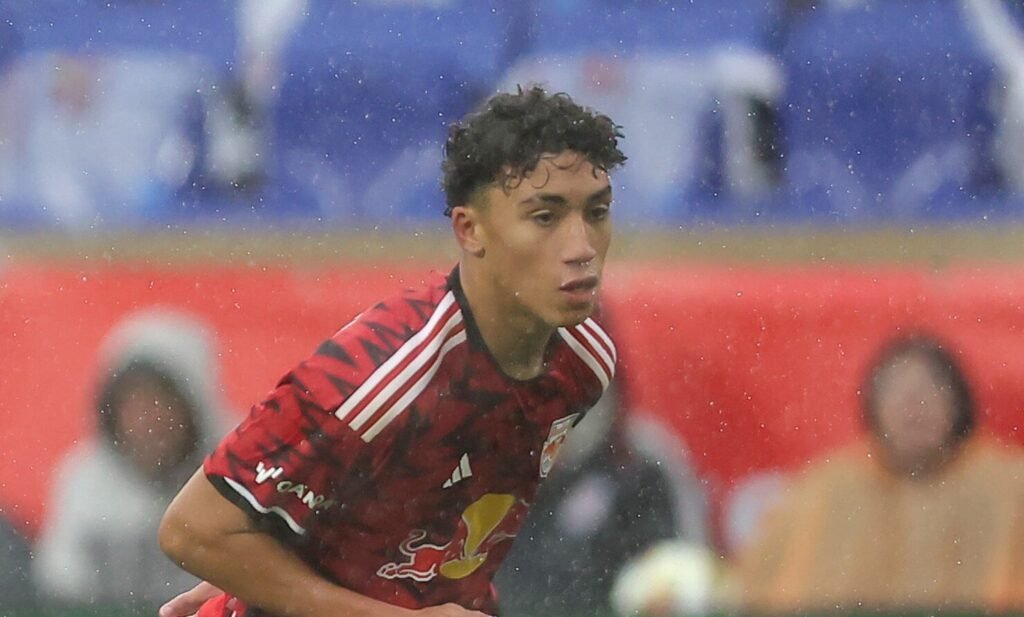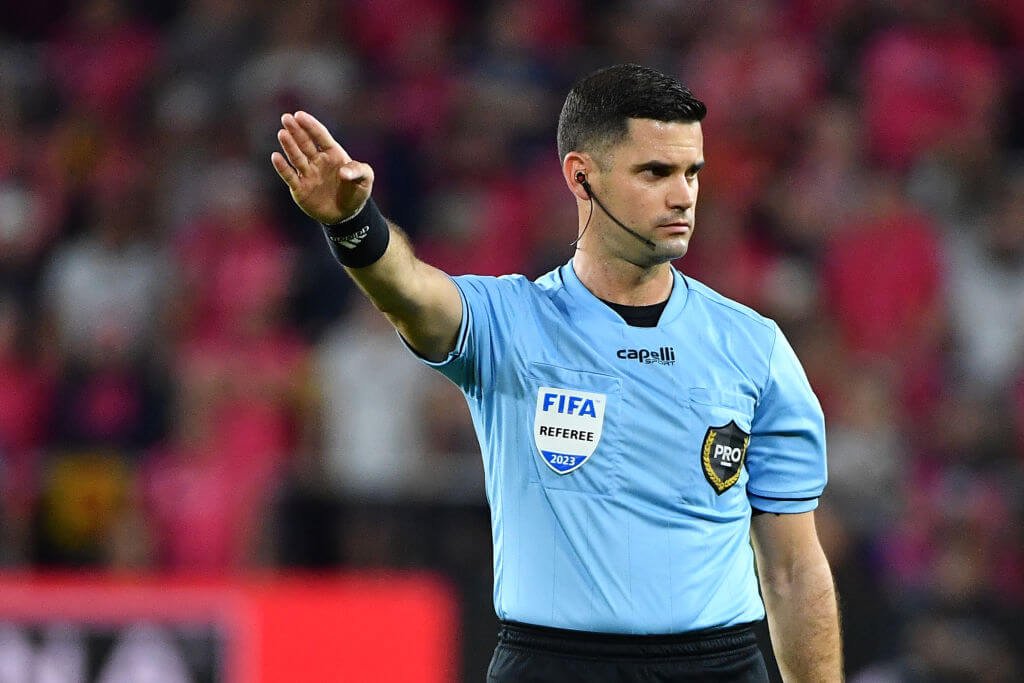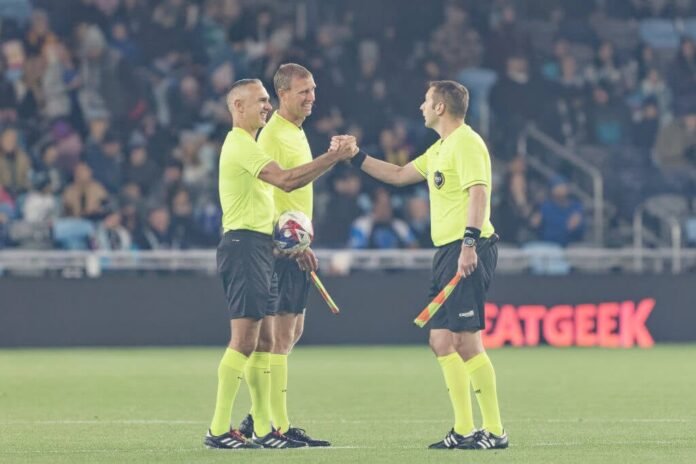Major League Soccer’s crew of full-time referees will return to the field this weekend after agreeing to a new, seven-year collective bargaining agreement with the Professional Referees Organization (PRO), the MLS-funded entity that administers professional refereeing in North America.
Talks between PRO and the Professional Soccer Referees Association (PSRA, the labor union that represents professional refs in the United States) broke down earlier this year and in mid-February, PRO locked its officials out. MLS started its season with replacement refs as the two sides continued to work towards an agreement. The federally mediated talks were sometimes volatile, with both sides publicly accusing each other of unfair practices and speaking out to the media.
Eventually, the two sides reached an accord on a new CBA, one which features significant increases in pay — 28% in the first year alone — for MLS officials. In the days following the agreement, figures on both sides of the agreement had plenty to say about it.
Terms and length of the deal
Sources associated with the league and club ownership groups seemed largely positive about the agreement. One source briefed on negotiations said that owners are especially pleased about its length, and in particular pointed out that the final two years, which take place after the 2026 World Cup, feature only modest salary bumps for the officials.
That viewpoint tracks with a memo sent by MLS senior vice president of sporting competition Nelson Rodriguez to team owners after the deal was signed on Tuesday morning. In his memo, which was acquired and verified by The Athletic, Rodriguez suggested that the CBA, in the long term, “will be net-neutral, if not more favorable, over that seven-year period.”
GO DEEPER
The 2024 MLS anonymous executive survey, part 1: Coaches, teams and players
Rodriguez pointed out that while the new deal represents an overall 28 percent increase for match officials from 2023, “when comparing salaries, game fees, benefits, and travel upgrades, (the CBA features) an average increase in compensation of approximately 4.35% in the subsequent six years of the deal.”
Rodriguez went on to characterize the gains made by the PSRA in the final version of the agreement as a “small increase” from the agreement that PSRA membership shot down in February.
According to the PSRA’s data, the final figures of the agreed-upon CBA represent an increase of $1.06 million over five years from the first tentative agreement. Over the full seven years of the agreement that amount rises to $2.7 million.
On the flipside, the seven-year term proved to be the biggest disappointment regarding the deal among PSRA referees contacted by The Athletic. Multiple such officials suggested they thought the PSRA would be in a less desirable negotiating position for the next CBA, with talks set to come years after at least one and possibly two World Cups, depending on whether the U.S. wins its bid to host the Women’s World Cup in 2027.

GO DEEPER
Anonymous MLS execs on roster rules, Apple TV and the Leagues Cup
Still, most of those polled were largely positive about the new agreement, impressed by a deal that sees an immediate and significant increase in compensation.
“If you look at the pay for senior (center) referees, you can actually begin to plan a future with that money,” said one PSRA member said, who was granted anonymity to protect their relationships in the game. “We have consistent raises that we can depend on, we have the match guarantees. All of that means that for the first time, you can sort of do some serious financial planning around your salary. To me, you can’t undersell the value of that.”

The replacement referees eventually drew the ire of players and coaches (Michael Janosz/ISI Photos/Getty Images)
Tenor of negotiations
Rodriguez and MLS commissioner Don Garber repeatedly shared the league’s belief that the replacement referees that PRO employed during the lockout were “up to a professional standard,” and at a similar level as PRO’s full-timers.
Garber himself suggested that the league’s players and coaches felt the same way, adding that the league had done market research that indicated the work stoppage mattered little to its fans and wouldn’t affect the long-term perception of the league itself.
“There is no consumer blowback,” Garber told The Athletic in a roundtable in March. “Not only do we not see that through the research we do, but we’ve got to look at where we are. The replacement officials are — not by our standards, but by the standards of PRO — are up to a pro(fessional) standard.”
Garber’s suggestions drew the ire of a contingent of MLS players, fans and head coaches, several of whom spoke out publicly after each of their matches had been marred by what they perceived as a blown call. The Major League Soccer Players Association (MLSPA) went a step further and put out a public statement, one which suggested Garber’s comments were “grossly inaccurate” and that the replacement refs were under-trained, lacked experience and were “not nearly at the level that a league of MLS stature deserves.”

GO DEEPER
How kickoff times and child labor laws have impacted Julian Hall’s MLS career
Garber and Rodriguez’s view is also not universally shared among team ownership groups.
“The quality of the replacement referees was an embarrassment at times,” said a stakeholder at an MLS club, who spoke on the condition of anonymity to protect their relationships. “Some of the missed calls, and the blown calls, they were really tough to deal with. I have no idea what they were talking about when it comes to the refs being at (a professional) standard. They pretty clearly weren’t. It was bizarre to read that.”
Every referee who spoke to The Athletic expressed some dismay at the tenor of negotiations as they unfolded. Earlier this month PRO, represented in negotiations by New York-based law firm Proskauer Rose, took the step of offering a “take it or leave it” mandate of sorts, suggesting that if PSRA membership didn’t approve their tabled offer they’d begin negotiating a deal with “less favorable terms.”
Proskauer Rose has earned a reputation for playing hardball in these types of negotiations, having advised the NBA, NHL and NFL in their respective labor stoppages over the past three decades. NHL commissioner Gary Bettman and former NBA commissioner David Stern were both former Proskauer attorneys, and the firm represented MLS when it won a landmark antitrust suit in 2000, a decision that solidified the league’s entire single-entity business model. It also represented MLS during the 2014 referee lockout.
The PSRA, responding to Garber’s comments earlier this month, characterized the league and PRO’s handling of the negotiations as having included “anti-union tactics,” a view mirrored by multiple referees amongst PSRA membership.
“Realistically, the league waited us out,” said one. “I am not surprised, at all, that they played dirty here — it’s been their M.O. in every labor negotiation they’ve ever had with players or anybody else. I am very, very curious to see how ugly their next negotiation with the MLSPA gets.”
The most recent CBA between MLS players and the league was agreed in early 2020 and runs until January 2028.
“There’s power in our union,” said another referee, “but financially, there is only so long a stoppage that any of us were equipped to deal with.”

MLS’s usual set of officials will return this weekend (Bill Barrett/ISI Photos/Getty Images)
Comparison to referee pay worldwide
Earlier this month, Garber also suggested that February’s tentative agreement PSRA’s membership had rejected would have made its membership “among the highest-paid officials in the world.”
“Think about that — third (highest-paid) or whatever the number was,” Garber said. “I think we all could agree that our players are not among the highest-paid in the world. We have supported the growth of officials because it needed it. We’re building again, with energy and resources, the growth of an entire new ecosystem of professional referees who are now on the field with world-class players.”
Data on referee compensation across the globe isn’t publicly available but The Athletic’s reporting, along with data compiled by the PSRA, does paint the deal struck between the PSRA and PRO in a favorable light. At the very least, MLS’s referee salaries are comparable to the top leagues in the world based on pure compensation, though officials in Spain and England tend to make more.
However, officials in those leagues also have a robust package of benefits that include a sizable payout on retirement, something lacking in the PSRA’s pact with PRO. A senior MLS referee with over a decade of experience, for example, is only entitled to six months of severance pay.
Referees in the German Bundesliga and Italy’s Serie A are also well-compensated, paid a match fee nearly four times higher than that of an MLS referee (though they receive a lower base salary.)
“I think most (owners) across the league feel that the refs are fairly compensated now,” said a stakeholder at an MLS club, who spoke anonymously to protect their relationships. “But if we’re paying a salary that’s globally competitive, we want better officiating. That’s I think what the general feeling is. The refs just have to be better. There are a few owners out there who think that the league is giving these guys too much money but even those guys will probably be fine with it if the quality gets better.”
The math gets more complicated, though, when you start to think about other factors — cost of living, inflation and the like.
“On paper our deal looks great,” said one PSRA member, “but it’s just cheaper to exist in some places than others — that’s true even within the U.S., let alone abroad.”
(Photo: Jeremy Olson/ISI Photos/Getty Images)
Read the full article here


